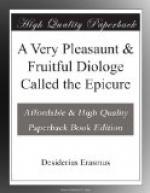Paule knewe what maner of thynges shoulde bee the
songes, queeres, daunsynges, and bankettes of vertuous
myndes, yea, in this lyfe. SPVDEVS but there
bee some leafull || pleasures, whyche they vtterlye
refuse. HEDONIVS. That maye bee, for the immoderate
vse of leafull and godly games or pastymes, is vnleaful:
and if you wyll excepte this one thing onlye, in al
other thei excelle whiche seeme too leade a paynfull
lyfe, and whome we take too bee ouerwhelmed with all
kynd of miseries. Now I prai you what more roialler
sight can ther be, then ye coteplatio of this world?
and such men as ye be in fauour of god keping his
holy comaudemetes & loue his most blessed testamet,
receiue far geater pleasure in the syght therof, then
thother sorte doo, for while thei behold wyth ouercurious
eyes, ye woderful worke, their mynde || is troubled
because they can not compasse for what purpose he
doeth such thinges, then thei improue the moost righte
and wise gouernour of all and murmour at his doinges
as though they were goddes of reprehension: and
often finde faute with that lady nature, and saye
that she is vnnaturall, whiche taunt forsooth with
as muche spite as can bee shewed with woordes, greueth
nature: but truely it reboundeth on hym, that
made nature, if there bee any at all. But the
vertuous man with godly & simple eyes beholdeth with
an excedyng reioyce of heart the workes of his Lorde
and father highly praysyng the all, and neither reprehedeth
nor || findeth faut with any of the, but for euery
thyng yeoueth moste hearty thankes, when he considereth
that al were made for the loue of man. And so
in al thynges, he praieth vnto the infinite power,
deuine wisedome, & goodnes of the maker, wherof he
perceiueth moste euident tokens in thynges that bee
here created. Now fain that there were suche a
palace in verie deede as Apuleus faineth, or
els one that were more royall and gorgeouse, and that
you shoulde take twoo thither with you too beholde
it, the one a straunger, whiche gooeth for this intent
onely too see the thyng, and the other the seruaut
or soonne of hym that firste causeth this buyldyng,
whether || will haue more delectie in it? the straunger,
too whom suche maner of house dooeth nothyng appartain,
or the soonne whiche beholdeth with greate ioye and
pleasure, the witte, riches, and magnificence of his
deerely beloued father, especially when he dooeth
consider all this worke was made for his sake. Sp.
Your question is too plain: for they most comunely
that bee of euill condicions, knowe that heauen and
all thinges contained therin, were made for mannes
sake. HEDO. Almoste al knowe that, but some
dooe not remembre it, shewyng theselues vnthakeful
for the great and exhuberat benefittes of god, & al
though thei remember it, yet that ma taketh || greater
delight in the sight of it whiche hath more loue vnto
the maker therof, in like maner as, he more chearfully
wyll behold the element whiche aspireth towarde the




